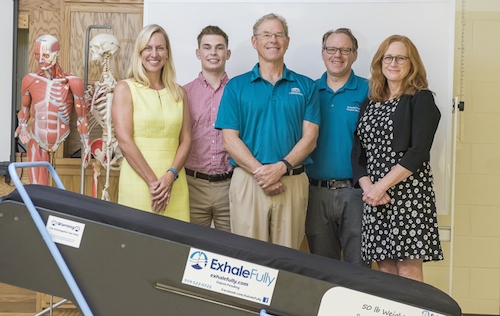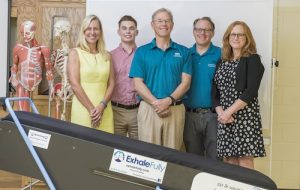COPD Patients Might Breathe Easier with Exercise Table Now Being Tested
Written by |

The COPD research team includes, from left to right, Justine Reel, David Giordano, Robert Boyce, Jared Kerr and Susan Sinclair. PHOTO BY: BRADLEY PEARCE/UNCW
A team of researchers at the University of North Carolina Wilmington (UNCW) is testing an exercise table that may help patients with chronic obstructive pulmonary disease (COPD) breathe easier
“The most exciting thing about this team is that they are coming from all disciplines,” Justine Reel, associate dean for research and innovation in the College of Health and Human Services and a professor in the School of Health and Applied Human Sciences at UNCW, said in a news release.
Exhale Fully, a North Carolina company, is developing the Easy Breather Exercise Table to help patients with COPD improve their breathing. The device was developed as a gravity-powered approach to improve ventilation while helping to clean the lungs.
The table appears stable, but rocks back and forth with weight. The person on the exercise table raises a bar and pulls it up, while rocking the table forward. As the individual pushes away, the table rocks backward, leaving the feet higher than the head. This movement forces air out of the lungs, which is often difficult for patients with COPD.
This approach supports elimination of excess secretions using gravity to help the tiny hairs move the mucus along the trachea. At the same time, gravity helps move the lymphatic fluid out of the lungs, and the movement of the abdominal viscera moves the respiratory diaphragm to reduce the work of breathing.
In addition to easier breathing, the motion of gravity powered ventilation helps lymphatic drainage in the arms and legs, improving circulation and reducing swelling.
One of the founders of the company, Bob Redden, a Southport resident and a COPD sufferer, found that the table has helped with his disease symptoms, but more testing is required to determine its full potential in patients with COPD.
The UNCW multidisciplinary team testing the table includes Reel; Jared Kerr and Susan Sinclair, both assistant professors in the School of Nursing’s Clinical Research program; David Giordano, an exercise science student; and Robert Boyce, associate professor of health and applied science.
“The project integrates a professional team, a community partner, and a North Carolina company,” said Kerr, adding the researchers have worked with the UNCW Center for Innovation and Entrepreneurship, and met the inventor at Elite Innovations in downtown Wilmington.
“It is often daunting for a small company to do scientific studies,” Kerr said.
After an initial testing period, the research team considered that the original model wasn’t ready for a study, so the table design was adjusted. This is the model that is being tested in the Human Performance Lab in Trask Coliseum. “It’s very different – much smoother,” Reel said.
Kerr and his colleagues are currently recruiting healthy volunteers to test the safety and usability of the table.
For Giordano, the exercise science student, the research project provides an opportunity to apply his classroom know-how to research that may potentially lead to a saleable product. “It helps me put it all together,” he said.





